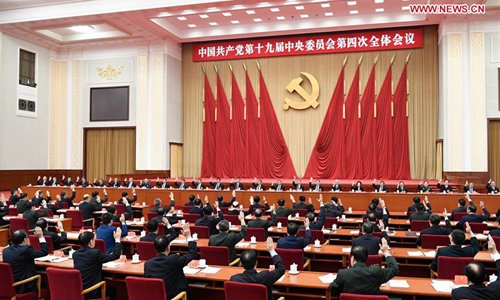HOME >> OPINION
Governance modernization supports China’s continuous development
By Zhang Shuhua Source:Global Times Published: 2019/11/4 22:08:40

The Political Bureau of the Communist Party of China (CPC) Central Committee presides over the fourth plenary session of the 19th CPC Central Committee in Beijing, capital of China. The session was held from October 28 to 31. Photo: Xinhua
The fourth plenary session of the 19th Central Committee of the Communist Party of China (CPC) held in Beijing from October 28 to 31 emphasized a strategic task for the Party: to uphold and improve socialism with Chinese characteristics. The key session aimed at modernization of China's system and capacity for governance.
Since the founding of the People's Republic of China 70 years ago, especially since the reform and opening-up four decades ago, this Asian country has always followed the socialist system, which has been effective in domains such as politics, economy, military, society and culture. Such a system enables China to overcome significant internal and external challenges.
Western societies have experienced social divisions precipitated by turmoil which their governments have failed to effectively deal with. After the Cold War, Western countries missed the great historical opportunities and wasted the huge peace dividend brought about by the end of the Cold War. From the financial crisis of 2007-08 to their current plight, it has been proven that the Western system of capitalism — including its political and economic systems — failed to address its problems, or pointed out a future for humanity.
China's system and development path are effective, worth carrying on. Faced with competition in times of globalization as well as domestic and international situations, China's fundamental system and other basic framework are effective and feasible. Unlike Western countries that hold each other's back, China can pool all necessary resources to solve major problems and is capable of dealing with all kinds of challenges.
China is able to balance between long-term and short-term development challenges, benefit people by alleviating poverty and bridge development gaps between different places. This is a hard task for many other countries.
China's political, economic, cultural and social systems have integrated, complementing and coordinating with each other. This is the foundation for the effectiveness of China's system, which ensures progress for the country, social modernization and capability to respond to various challenges at home and abroad.
How to comprehend and evaluate China's governance? In the past seven decades, China has passed through tortuous paths, but has accumulated plenty of experience in modernization, market economy, globalization and interacting with the rest of the world. The West, which used to lead far ahead or dominate human progress, has been in decline. The clout of the East and the West has changed remarkably and their development paths and systems share a rivalry. The global situation and development road map have fundamentally changed.
China's unique path, system and development model can be an alternative for other countries to address their problems and common challenges mankind faces. China's governance is unique, but its common values and international significance deserve to be studied and it offers lessons for other countries.
China should attach importance to the actual effects of the systems and policies, avoiding blindly following certain system or institution. A system is the combination of a series of rules. The construction of a system should be undertaken keeping pace with the times, should be focused on development, and not simply emphasize system itself.
Different systems should be measured at different levels. In addition to the fundamental system as well as basic and crucial ones, some specific practices and rules of politics, law, economy, culture and diplomacy can also be used to measure the different divisions of a system.
Furthermore, systems should be integrated with each other, rather than being mutually exclusive. Efforts should be made to boost leadership and improve governance efficiency. China needs to carry forward the spirit of being people-centric and pragmatic, seek truth from facts and avoid lip service, and thus encourage the system to exercise its maximum potential and ensure sound policies of the CPC and government implemented under a flexible and efficient system. China should rest on its system to develop its leadership and administrative capabilities, improve people's sense of benefiting in the process of reform and development, and meet their growing desire and pursuit for a better life.
The author is director of the Institute of Information Studies at the Chinese Academy of Social Sciences. opinion@globaltimes.com.cn
Posted in: VIEWPOINT